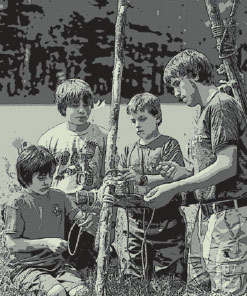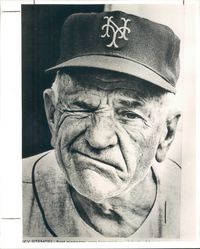 This week, a couple questions from readers:
This week, a couple questions from readers:
Requiring parents to register
Can a troop require that parents of Scouts register as adult members? Our troop insists that one parent of each Scout register as an assistant Scoutmaster or a troop committee member, and charges the adult registration fee as part of the Scout’s registration.
The BSA doesn’t really rule on this one way or the other, but leaves it up to the units to determine the need for adult leadership beyond the minimum requirements: Continue reading “Q&A: Requiring adult involvement, can Scouts go soaring?”


 On Scout Sunday, I visited the Blue & Gold Banquet of a Cub Scout pack that I am the commissioner for. The pack is well-run, with exciting and interesting activities planned in advance throughout the year. Most of the Scouts received advancement recognition or awards of some kind, and all dens took part in the entertainment segment of the program. Each den has a den leader and parent help. The most important observation I made was that the boys are having a great time.
On Scout Sunday, I visited the Blue & Gold Banquet of a Cub Scout pack that I am the commissioner for. The pack is well-run, with exciting and interesting activities planned in advance throughout the year. Most of the Scouts received advancement recognition or awards of some kind, and all dens took part in the entertainment segment of the program. Each den has a den leader and parent help. The most important observation I made was that the boys are having a great time. One of the most fascinating and fulfilling things about being part of the Scouting movement is watching our young people grow and develop as individuals, team members and leaders.
One of the most fascinating and fulfilling things about being part of the Scouting movement is watching our young people grow and develop as individuals, team members and leaders.
 As we get back into high gear with our pack and troop programs, we may find that we’ve had some “churn” in our adult commitments. Perhaps a family moved away over the summer or decided on a shift in priorities. When that happens, an adult who made a commitment to volunteer in our unit is no longer available. This churn is most common in Cub Scouting, as den leaders move up and new dens (particularly Tiger dens) form, membership in the various den levels gets redistributed, or an adult in a key role has experienced a change in outside commitments, such as work or other involvement, and can’t continue in that role.
As we get back into high gear with our pack and troop programs, we may find that we’ve had some “churn” in our adult commitments. Perhaps a family moved away over the summer or decided on a shift in priorities. When that happens, an adult who made a commitment to volunteer in our unit is no longer available. This churn is most common in Cub Scouting, as den leaders move up and new dens (particularly Tiger dens) form, membership in the various den levels gets redistributed, or an adult in a key role has experienced a change in outside commitments, such as work or other involvement, and can’t continue in that role.